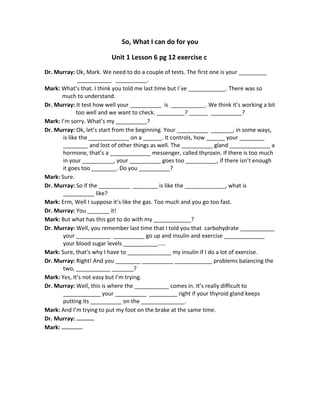
Understanding thyroid function and diabetes control
- 1. So, What I can do for you Unit 1 Lesson 6 pg 12 exercise c Dr. Murray: Ok, Mark. We need to do a couple of tests. The first one is your _________ … … ___________ __________. Mark: What’s that. I think you told me last time but I´ve ____________. There was so . . . . .. much to understand. Dr. Murray: It test how well your __________ is ___________. We think it’s working a bit … too well and we want to check. _________? ______ __________? Mark: I’m sorry. What’s my __________? Dr. Murray: Ok, let’s start from the beginning. Your __________ _______, in some ways, is like the _____________ on a ______. It controls, how ______ your ________ ________ and lost of other things as well. The __________ gland _____________ a hormone, that’s a _____________ messenger, called thyroxin. If there is too much in your __________, your __________ goes too __________, if there isn’t enough it goes too ________. Do you __________? Mark: Sure. Dr. Murray: So if the __________ ________ is like the _____________, what is __________ like? Mark: Erm, Well I suppose it’s like the gas. Too much and you go too fast. Dr. Murray: You _______ it! Mark: But what has this got to do with my ____________? Dr. Murray: Well, you remember last time that I told you that carbohydrate ___________ your ___________ __________ go up and insulin and exercise _____________ your blood sugar levels ___________..... Mark: Sure, that’s why I have to ______________ my insulin if I do a lot of exercise. Dr. Murray: Right! And you ________ __________ ____________ problems balancing the two, ___________ _______? Mark: Yes, It’s not easy but I’m trying. Dr. Murray: Well, this is where the ___________ comes in. It’s really difficult to ____________ your __________ _________ right if your thyroid gland keeps putting its __________ on the ______________. Mark: And I’m trying to put my foot on the brake at the same time. Dr. Murray: ………… Mark: …………..